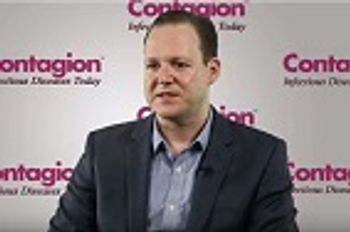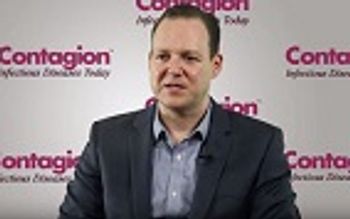
Emily Heil, PharmD, BCPS-AQ ID, from the University of Maryland School of Pharmacy, discusses the concerns of antibiotic use in agriculture.

Emily Heil, PharmD, BCPS-AQ ID, from the University of Maryland School of Pharmacy, discusses the concerns of antibiotic use in agriculture.

Jason C. Gallagher, PharmD, president, Society of Infectious Diseases Pharmacists, explains if we know how the case of mcr-1 E. coli superbug was contracted.

Marion A. Kainer, MD, MPH, FRACP, FSHEA, Director of Healthcare Associated Infection and Antimicrobial Resistance Program, Tennessee Department of Health, discusses some of the key points to aid in the fight against healthcare associated infections, nationwide.

Jason C. Gallagher, PharmD, President, Society of Infectious Diseases Pharmacists describes the recent case of an antibiotic resistant “superbug” in Pennsylvania.

Marion A. Kainer, MD, MPH, FRACP, FSHEA, Director, Healthcare Associated Infections and Antimicrobial Resistance Program, Tennessee Department of Health, explains how the CDC aid state health departments in the fight against healthcare associated infections.

Christina G. Tan, MD, MPH, FACP, New Jersey State Epidemiologist/Assistant Commissioner, outlines New Jersey Department of Health’s role in vaccine awareness.

Christina G. Tan, MD, MPH, FACP, New Jersey State Epidemiologist/Assistant Commissioner, provides background on New Jersey Department of Health’s Zika prevention program, ZAP Zika.

Christina G. Tan, MD, MPH, FACP, New Jersey State Epidemiologist/Assistant Commissioner, examines the probability of a Zika outbreak in New Jersey.

Christina G. Tan, MD, MPH, FACP, New Jersey State Epidemiologist/Assistant Commissioner, explains how health care practitioners can aid in the prevention of Zika virus infections.

Christina G. Tan, MD, MPH, FACP, New Jersey State Epidemiologist/Assistant Commissioner, discusses Zika vector prevalence and infection prevention in New Jersey

Charitha Gowda, MD, MPH, infectious diseases physician at Penn Presbyterian Medical Center discusses the impact direct-acting antivirals have had on patients’ adherence to their drug regimen when treating hepatitis C.

Rohit Bhalla, DO, Chief of the Section of Infectious Diseases at the University Medical Center of Princeton, discusses a concerning trend among individuals to purposefully infect themselves with the Zika virus, in the hopes of building up an immunity.

Charitha Gowda, MD, MPH, Infectious diseases physician at Penn Presbyterian Medical Center explains how the treatment regimen for treating those with acute hepatitis C differs from chronic hepatitis C.

Rohit Bhalla, DO, Chief of the Section of Infectious Diseases at the University Medical Center of Princeton, shares what other diseases could be mistaken for a Zika virus infection.

Charitha Gowda, MD, MPH, Infectious diseases physician at Penn Presbyterian Medical Center explains the process for the evaluation of hepatitis C, leading up to treatment.

Rohit Bhalla, DO, Chief of the Section of Infectious Diseases at the University Medical Center of Princeton, discusses if we will see more vaccine-preventable diseases in the United States in the future.

Charitha Gowda, MD, MPH, discusses the current and upcoming methods to prevent hepatitis C.

Rohit Bhalla, DO, Chief of the Section of Infectious Diseases at the University Medical Center of Princeton, explains the current guidelines for women with regards to pregnancy and the Zika virus.

Rohit Bhalla, DO, Chief of the Section of Infectious Diseases at the University Medical Center of Princeton, shares how healthcare practitioners can help stop the spread of mumps.

Dr. Rohit Bhalla, DO, Chief of the Section of Infectious Diseases at the University Medical Center of Princeton, explains why an individual could still become infected with mumps, even after receiving vaccinations.

Charitha Gowda, MD, MPH, explains why we see such a high incidence of HIV / HCV coinfection.

Rohit Bhalla, DO, Chief of the Section of Infectious Diseases at the University Medical Center of Princeton, explains what the public can do to protect themselves from contracting mumps.

Rohit Bhalla, DO, provides information healthcare practitioners should know about diagnosing a Zika virus infection, particularly as the virus moves in the United States.

Charitha Gowda, MD MPH, infectious diseases physician at Penn Presbyterian Medical Center discusses the recent decision from The Department of Veterans Affairs (VA) to supply hepatitis C (HCV) treatment to all veterans, regardless of disease stage.

Rohit Bhalla, DO, Chief of the Section of Infectious Diseases at the University Medical Center of Princeton, explains why the Zika virus is “scarier than [the CDC] originally thought.”

Rohit Bhalla, DO, Chief of the Section of Infectious Diseases at the University Medical Center of Princeton, discusses whether or not the public should be concerned about the recent mumps outbreaks.

Charitha Gowda, MD MPH, infectious diseases physician at Penn Presbyterian Medical Center, explains the barriers to hepatitis C (HCV) treatment.

Christina G. Tan, MD, MPH, FACP, NJ State Epidemiologist/Assistant Commissioner, discusses the alleged increase in food-borne infections.

Rohit Bhalla, DO, Chief of the Section of Infectious Diseases at the University Medical Center of Princeton, explains why we are seeing a recent resurgence of mumps in the United States.

Charitha Gowda, MD MPH, infectious diseases physician at Penn Presbyterian Medical Center discusses the preferred treatment method for hepatitis C.